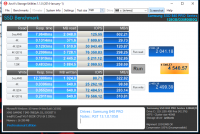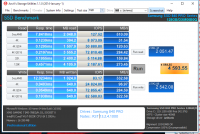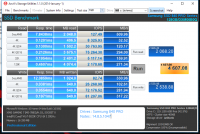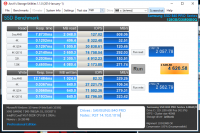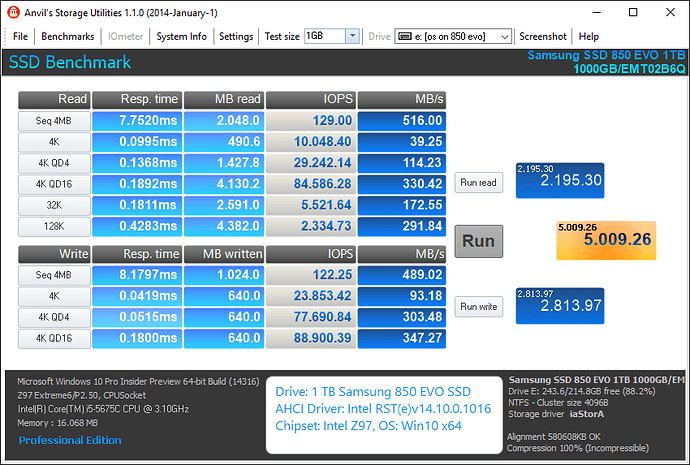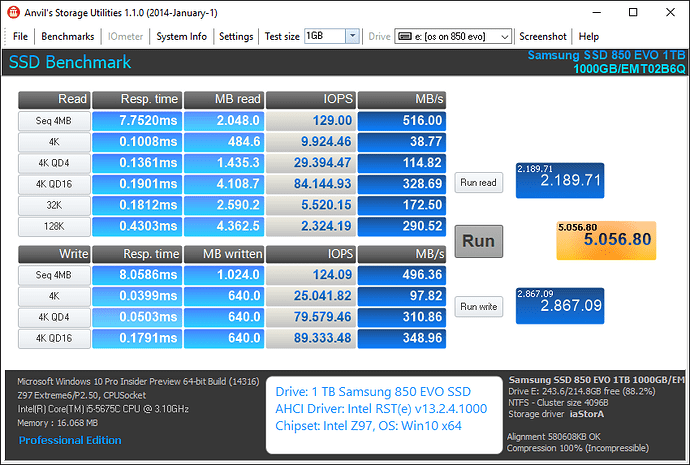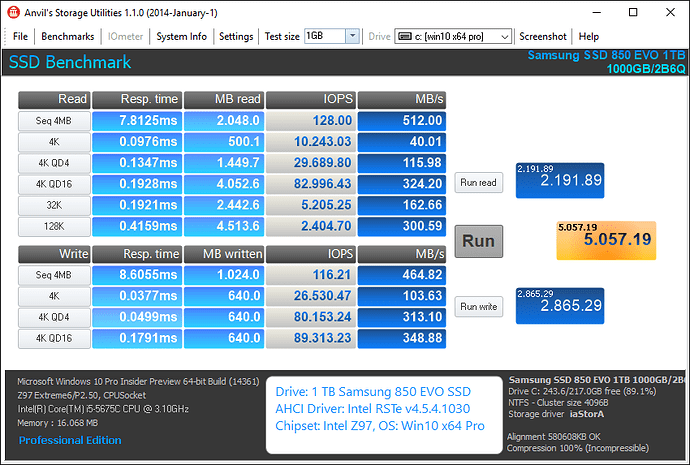Just wondering does the older Intel RST driver v11.2.0.1006 support trim on a ssd.I have a z97 mpower max ac mb and this driver gives me the best benchmark scores with AnvilPro. running ahci mode.
Yes, it does.
v11.2.0.1006 and v13.2.4.1000 are pretty close though.
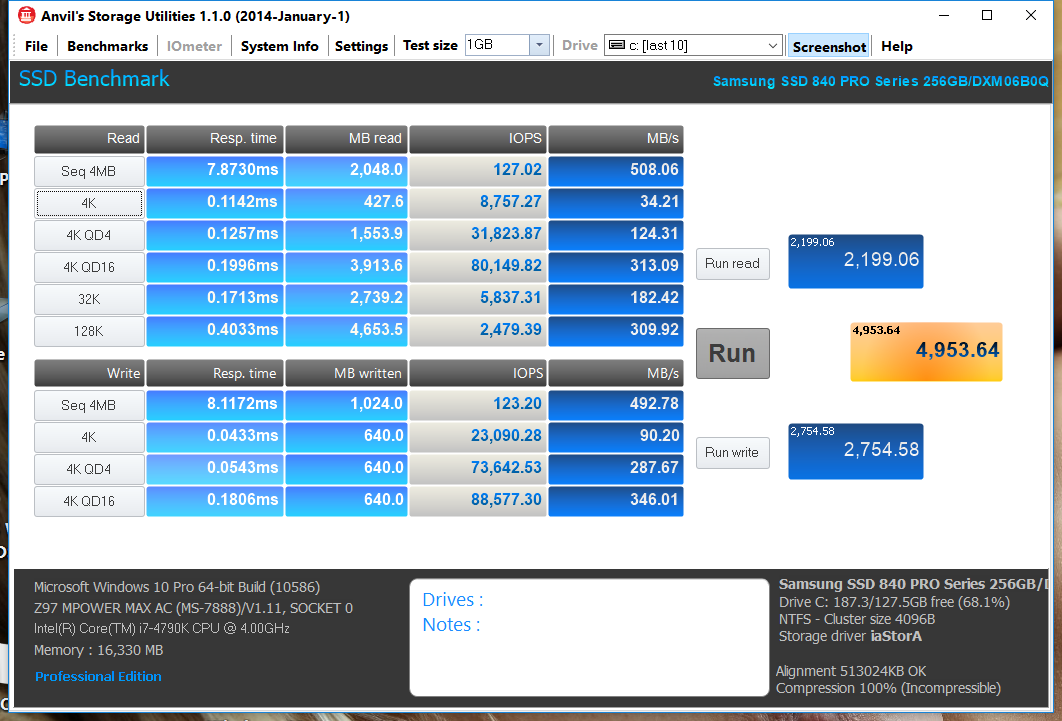
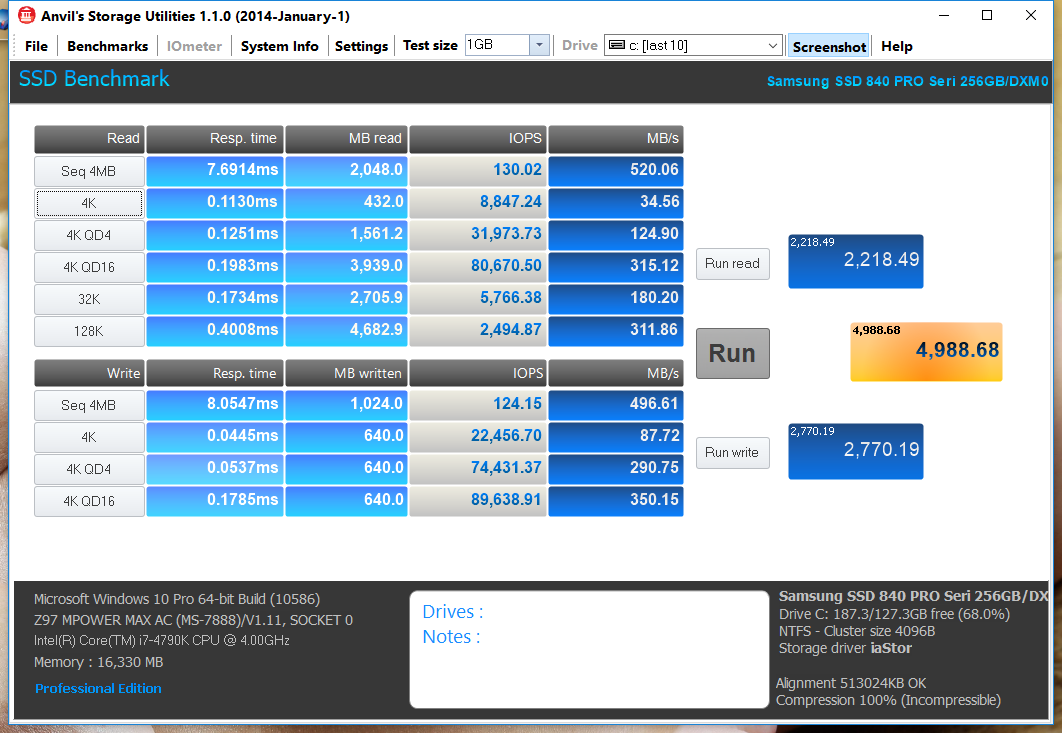
So I’ve decided to bench my X99 system with different drivers and these are the results:
(tested with AHCI mode with bios version H.C6 and OROM 13.1.0.2126)
13.1.0.1058
13.2.4.1000
14.8.5.1047
14.10.0.1016
Since the x99 is part of the 9 series chipset, Fernando, you should give a try to these 14.10.xx drivers on your Z97 system. They seem to be performing better than the 13.2.4.1000 by a small margin.|addpics|6uk-1-0473.png-invaddpicsinvv,6uk-2-4b7b.png-invaddpicsinvv,6uk-3-4ab0.png-invaddpicsinvv,6uk-4-41ba.png-invaddpicsinvv|/addpics|
@TigTex :
Thanks for having done the benchmark comparison tests and posted the results here.
The Intel X99 chipset belongs to the C610 Series Chipsets and not to the 9-Series ones (look >here<).
Nevertheless I have done some tests with my Z97 system running Win10 x64 IP Build 14316. The test drive was the 1 TB Samsung 850 EVO running in AHCI mode.
Here are my test results:
1. Intel RST(e) driver v14.10.0.1016:
2. Intel RST(e) driver v13.2.4.1000:
Since the brandnew Intel RST(e) drivers v14.8.7.1051 WHQL dated 03/08/2016 are available since today, I have done a quick benchmark comparison test v14.8.7.1051 vs. v13.4.2.1000 using my current Z97 system running the 1 TB Samsung 850 EVO SSD in AHCI mode.
Here are the results:
1. Intel RST(e) AHCI driver v14.8.7.1051 WHQL:
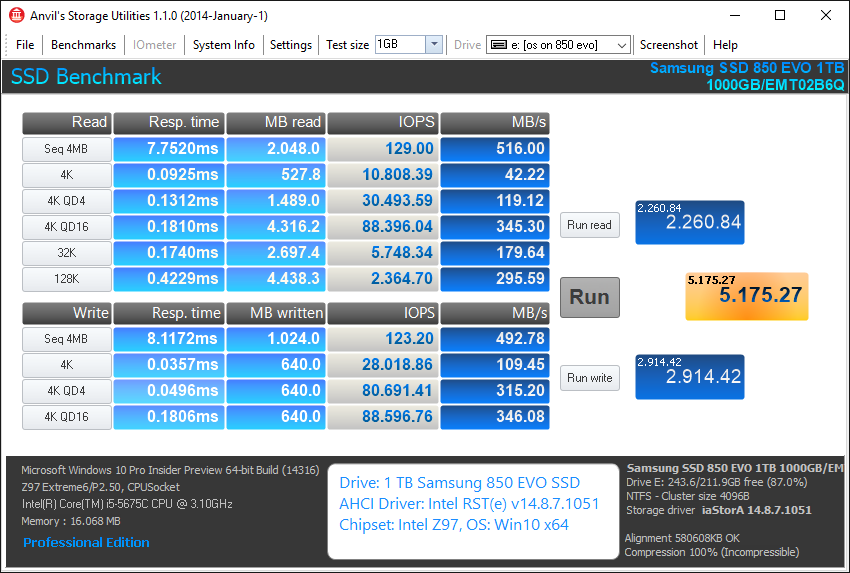
2. Intel RST(e) AHCI driver v13.2.4.1000 WHQL (Note: Anvil’s Storage Utilities doesn’t show the correct driver version):
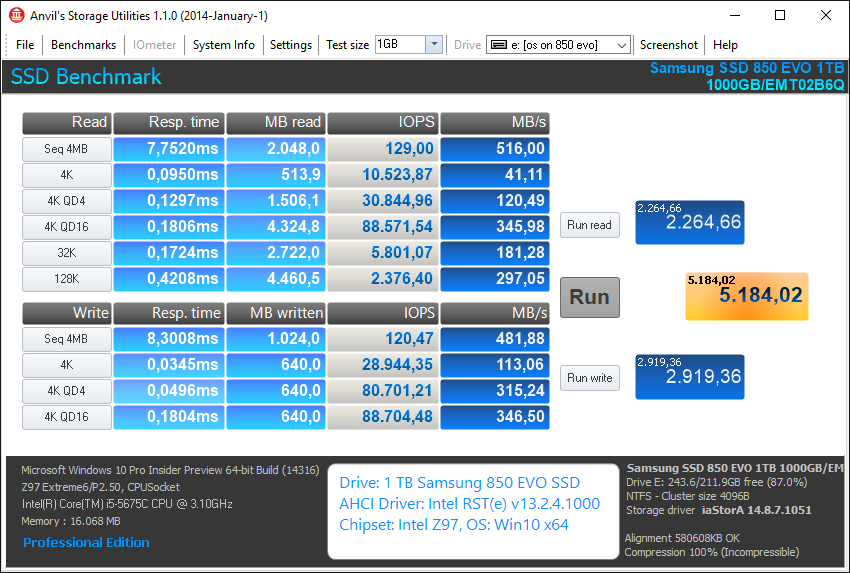
Since the Intel RST(e) drivers v15.0.0.1031 dated 02/09/2016 are available since today, I have done a quick benchmark test with my Z97 system running Win10 x64 on the 1 TB Samsung 850 EVO SSD in AHCI mode.
These were my test candidates:
1. Intel RST(e) driver v13.2.4.1000 WHQL
2. Intel RST(e) driver v14.8.9.1053 WHQL
3. Intel RST(e) driver v15.0.0.1031
Here are the results:
1. Intel RST(e) AHCI driver v13.2.4.1000 WHQL:
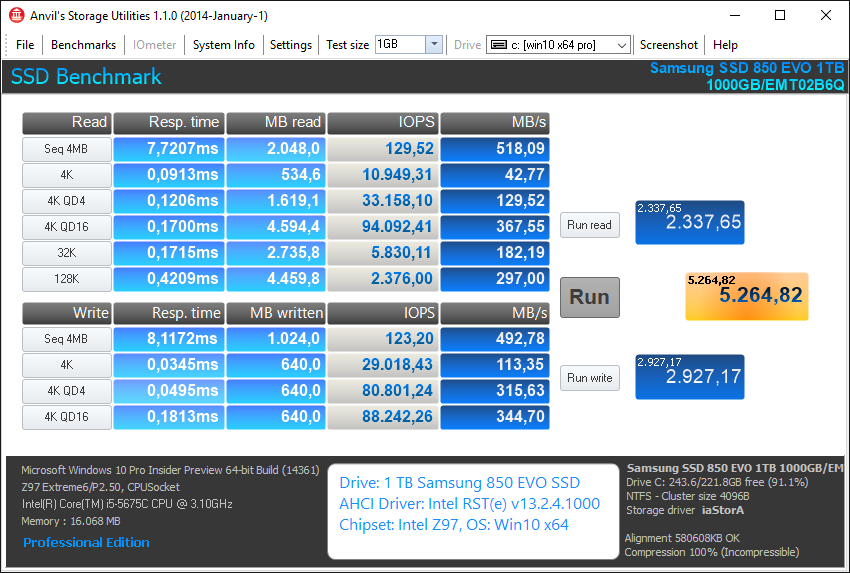
2. Intel RST(e) AHCI driver v14.8.9.1053 WHQL:
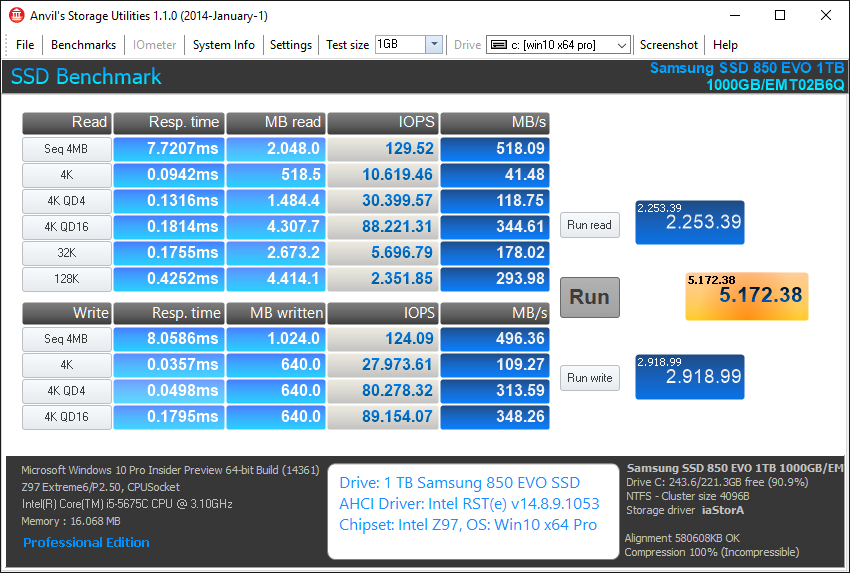
3. Intel RST(e) AHCI driver v15.0.0.1031:
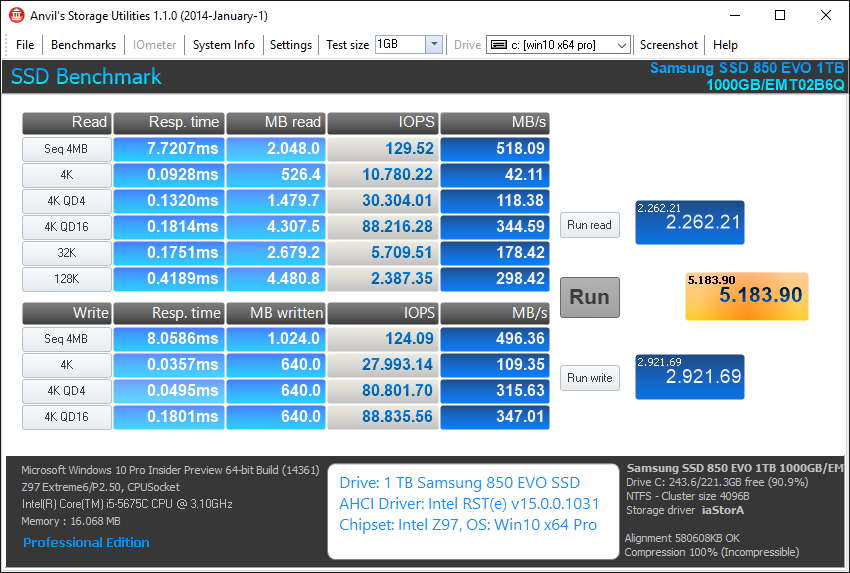
Conclusion:
The Intel RST(e) driver v13.2.4.1000 is still the winner for my Z97 AHCI system regarding the benchmark results.
Hi Fernando,
when you get around to your next driver benchmark, would you please include RST Enterprise drivers as well? Preferably the latest one. I am curious as to how they fare against the regular ones.
Here are the results I got with my (non-Enterprise) Intel Z97 system running the mod+signed variant of the Intel RSTe driver v4.5.4.1030:
Since I have used the exact same test system, you can compare the scores with those I have published 2 posts above.
Thanks for this! This gives me a ballbark estimate for their performance being generally slower than the regular ones.
Since the Intel RST(e) drivers v15.0.0.1039 dated 05/23/2016 are available since today, I have done a quick benchmark test with my Z97 system running Win10 x64 Insider Preview Build 14379 on the 1 TB Samsung 850 EVO SSD in AHCI mode.
These were my test candidates:
1. Intel RST(e) driver v13.2.4.1000 WHQL
2. Intel RST(e) driver v15.0.0.1039 mod+signed by me
Here are the results:
1. Intel RST(e) AHCI driver v13.2.4.1000 WHQL:
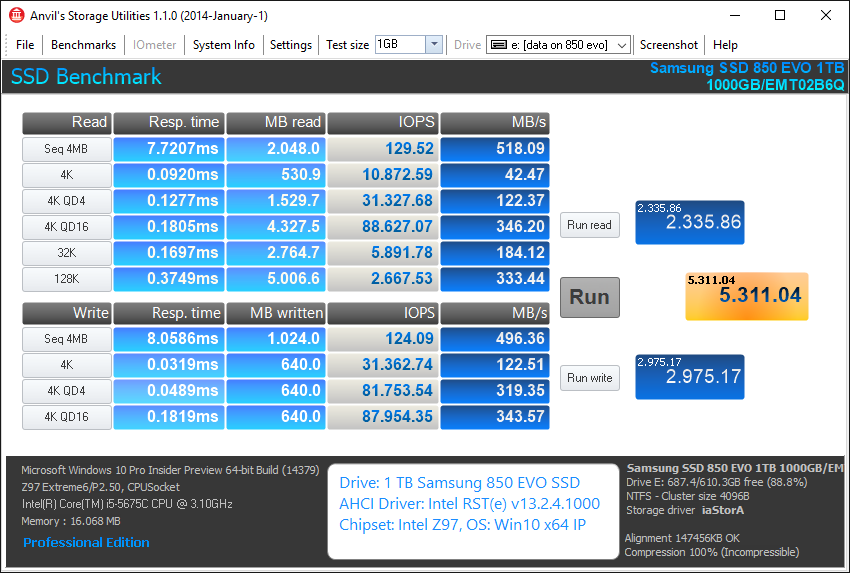
2. Intel RST(e) AHCI driver v15.0.0.1039 mod+signed:
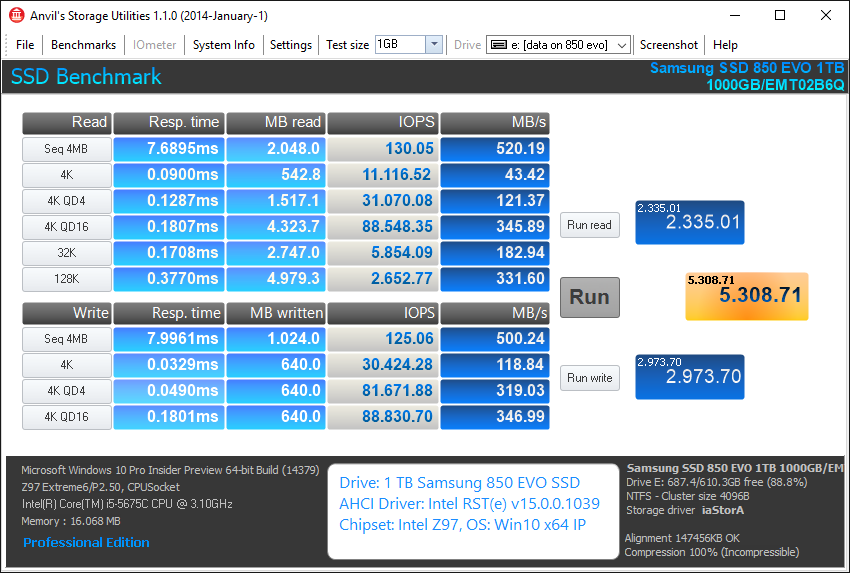
Conclusion:
The brandnew Intel RST(e) drivers v15.0.0.1039 obviously have a very good performance even with 9-Series Chipset AHCI systems (although they natively do not support them). The scores are nearly the same as those I got with my hitherto “favorite” Intel RST(e) driver v13.2.4.1000.
It seems, that the new Intel RST(e) driver line v15 is very promising regarding the performance, especially in combination with the upcoming “Anniversary Update” of Win10.
Intel RST(e) AHCI driver v15.0.0.1039 WHQL and Intel MEI Driver 11.5.0.1011 WHQL on Windows 7 Ultimate 64-bit SP1 with UEFI Boot and GOP enabled + disabled CSM using 2TB SSHD.
Best storage performance for me so far.
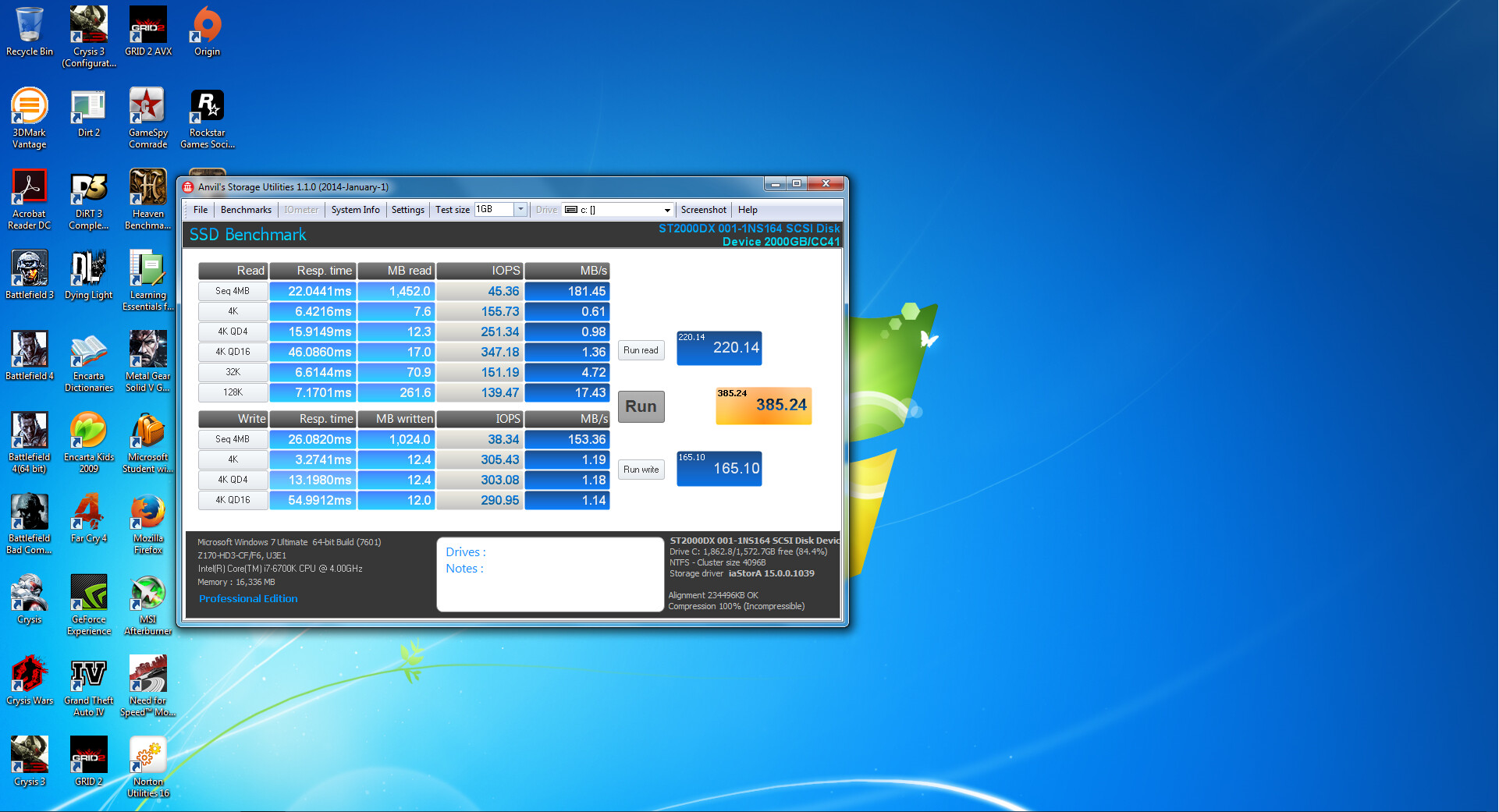
The benchmark results you got are the worst I have seen since a very long time.
Yeah, I’m using a hybrid HDD which is very slow compared to SSDs. I’m going to move on to a 2TB SSD once they come down in price but for now SSHD does the job for me since I mostly play games and do a bit of Ubuntu virtual machines every now and then.
@rootuser123 :
The WRITE scores of your SSHD are so low, that I suspect, that you haven’t even checked both Write-Caching options as shown here:
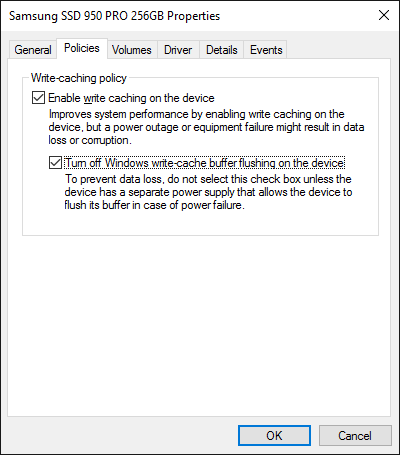
@Fernando I haven’t done that yet cause the 2nd option was unchecked by default. Thanks for the tip. I’ll rerun the benchmark now.
What is the best driver for my Asus Z170 Gaming Pro?
@Scoty :
Welcome at Win-RAID Forum!
You will find the asnswer within the start post of >this< thread.
By the way: Since all Intel 100-Series Chipset mainboards have a technically similar on-board Intel SATA Controller, the individual Intel 100-Series Chipset of the mainboard doesn’t matter regarding the choice of the “best” Intel AHCI or RAID driver.
Regards
Dieter (alias Fernando)
Since I got access to a Z170 Chipset system running the latest Win10 x64 Build 14393.5 in AHCI mode on my good old 1 TB Samsung 850 EVO SSD, I have done some benchmark comparison tests using the following AHCI drivers:
1. Win10 in-box MS AHCI driver named STORAHCI.SYS,
2. Intel RST(e) AHCI driver v13.2.4.1000.
3. Intel RST(e) AHCI driver v14.8.9.1053
4. Intel RST(e) AHCI driver v15.0.0.1039
Here are the surprising results I got (the same order from the left to the right):
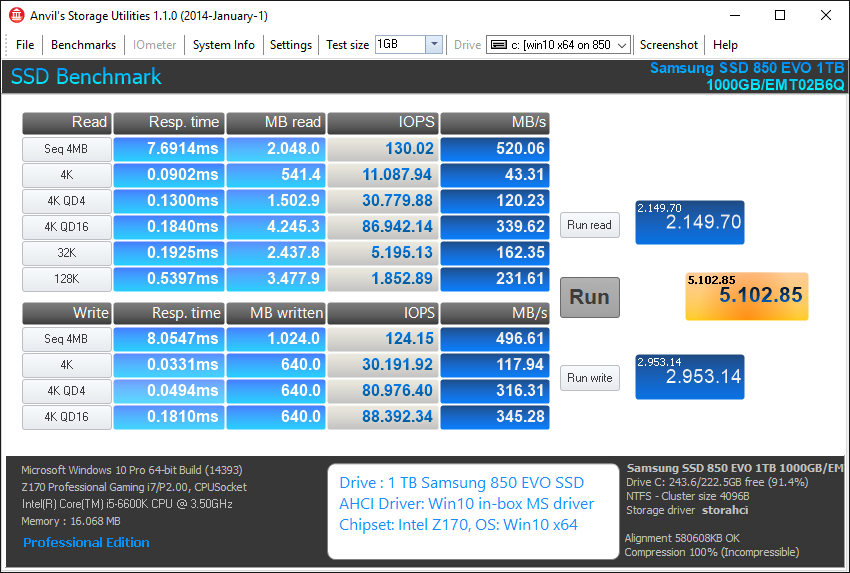
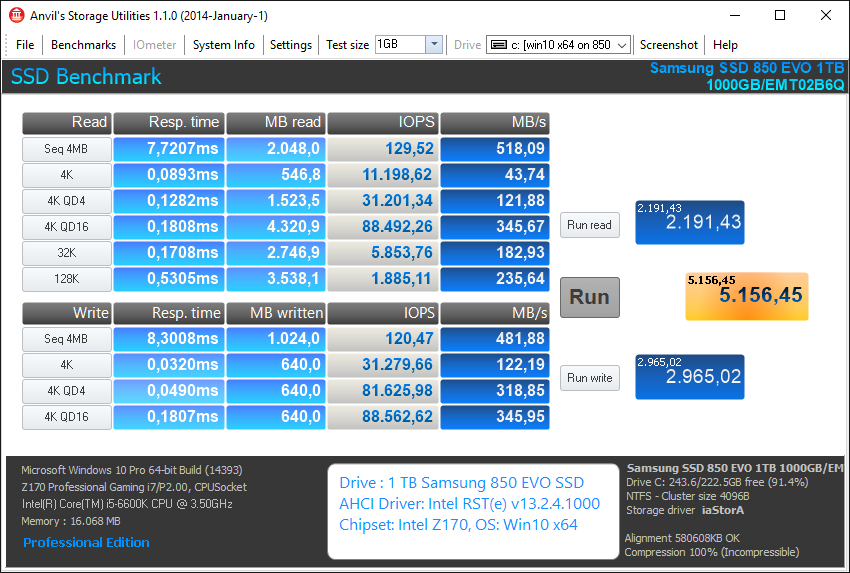
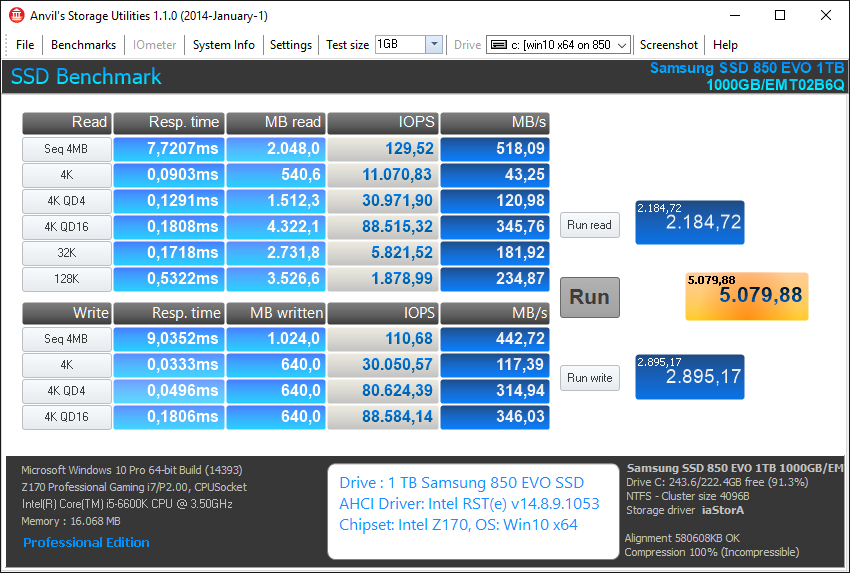
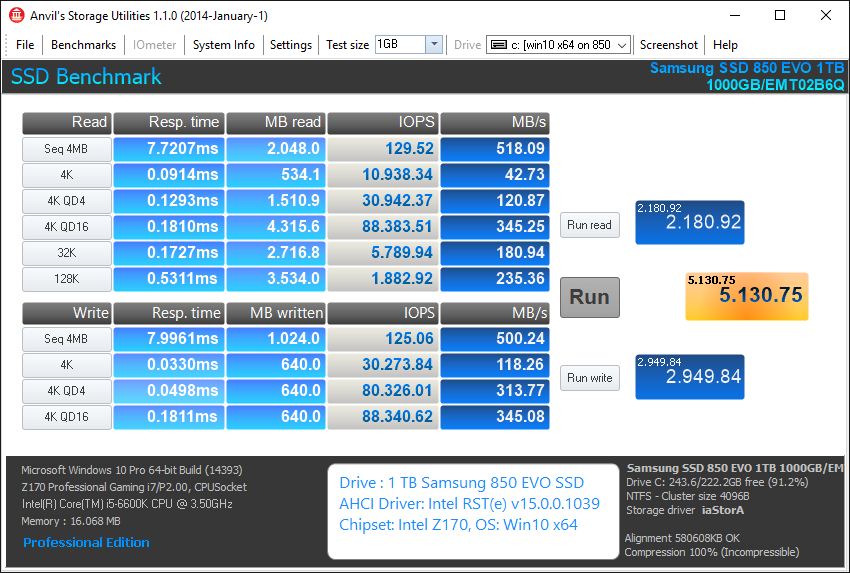
Ranking:
1. Intel RST(e) AHCI driver v13.2.4.1000 had the absolutely best performance (although this driver natively doesn’t even support any Skylake system)
2. Intel RST(e) AHCI driver v15.0.0.1039
3. MS Win10 in-box AHCI driver
4. Intel RST(e) AHCI driver v14.8.9.1053
Since I recently got an Intel Z170 chipset mainboard with at least 3 “Ultra M.2 Ports” (each of them supporting 4 PCIe 3.0 lanes), I took yesterday the opportunity to test the creation of an Intel RAID0 array consisting of 2 NVMe SSDs and - if successful- to do a clean install of the brandnew Win10 x64 v1607 (“Anniversary Update”) onto it and to check its performance.
Furthermore I wanted to find out, whether it is possible to create and use an Intel RAID0 array, whose members are different NVMe SSD models. In my case I had just
a) a single 256 GB Samsung 950 Pro and
b) a single 256 GB Samsung SM951 NVMe.
Short summary of my test results:
After having found out the exact procedure how to do it, I was able to successfully create the RAID0 array by combining the Samsung 950 Pro and the Samsung SM951 NVMe SSDs and to get the “Anniversary Update” of Win10 x64 clean properly installed onto it.
Here are the related benchmark results:
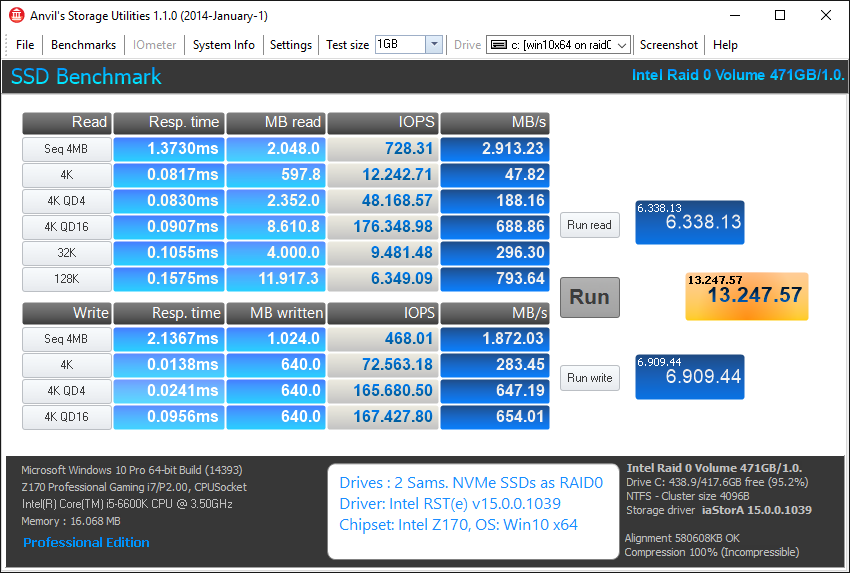
Test configuration:
- Mainboard: ASRock Fatal1ty Professional Gaming i7
- BIOS: latest vailable v2.00 with updated Intel EFI RaidDriver, CSM disabled, Fast Boot enabled, no overclocking!
- Creating of the RAID0 array: used Intel RST(e) RAID Utility: v15.0.0.2173, stripe size: 32KB
Note: Although a bigger stripe size (64KB or 128 KB) would have given me much higher “Seq 4MB” scores and better total scores, I have chosen a moderate stripe size for a better performance while doing my daily work (the big majority of the usually processed files are small or even very small sized). - Used “F6 driver”: 64bit Intel RST(e) driver v15.0.0.1039 WHQL (has to be loaded at the beginning of the Win10 installation)
- Performance boost actions: as written >here<
Additional find, which may be interesting for users, who want to create a similar system:
Only the Setup of the brandnew Win10 “Anniversary Update” image supports the usage of an Intel RST(e) driver, which belongs to the v15 series. Users, who are trying to get any older (pre-v1607) Win10 image installed, have to load an Intel RST(e) RAID driver of the v14 series (only versions from v14.6.x.xxxx up do support the creation of an NVMe RAID).
